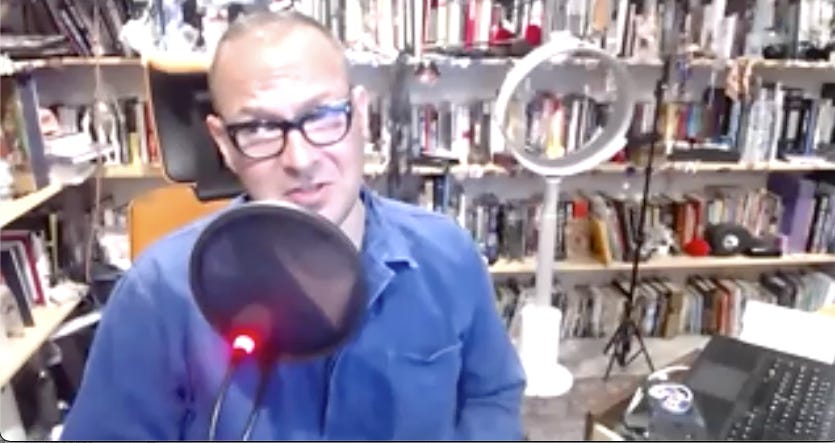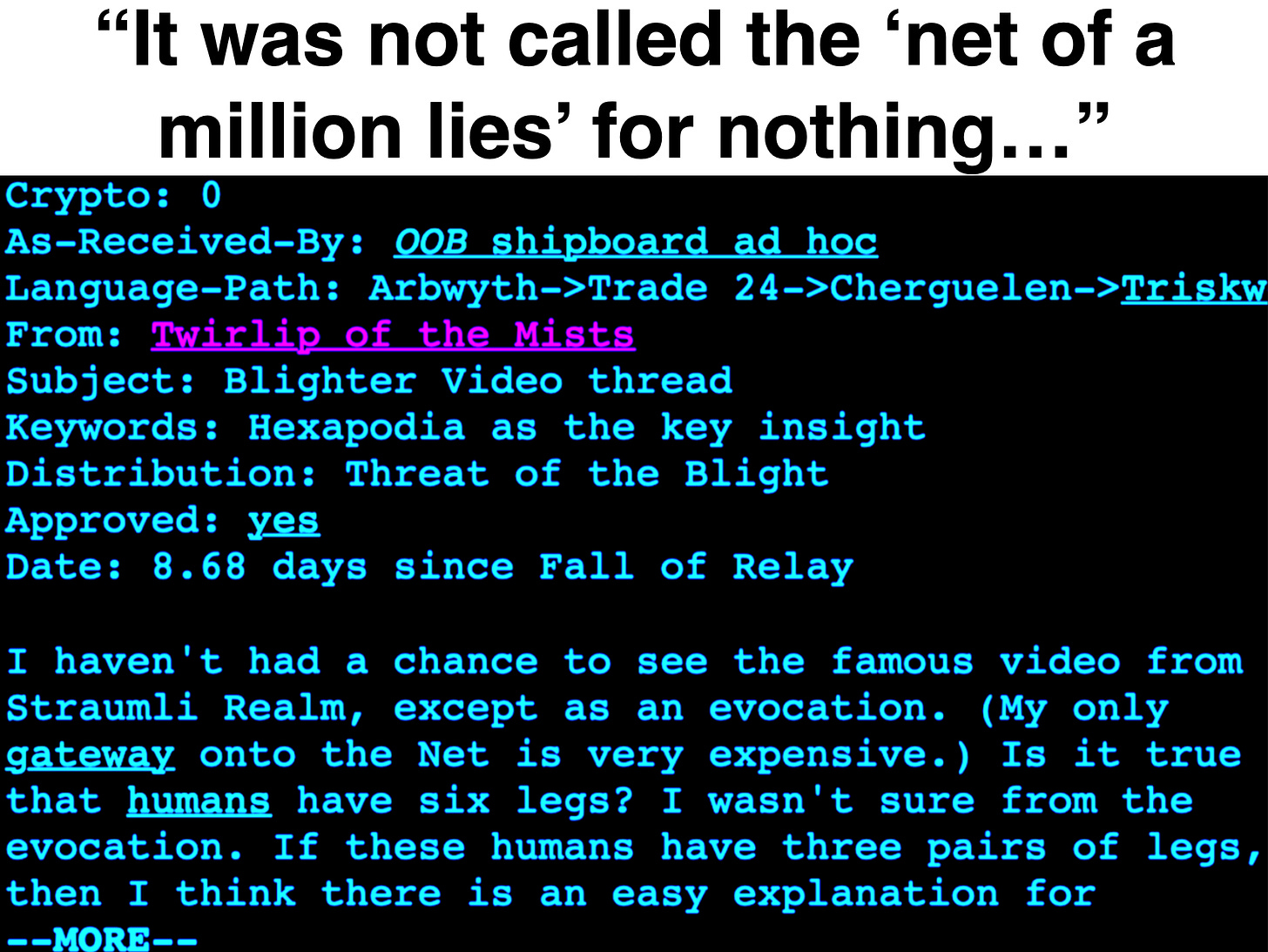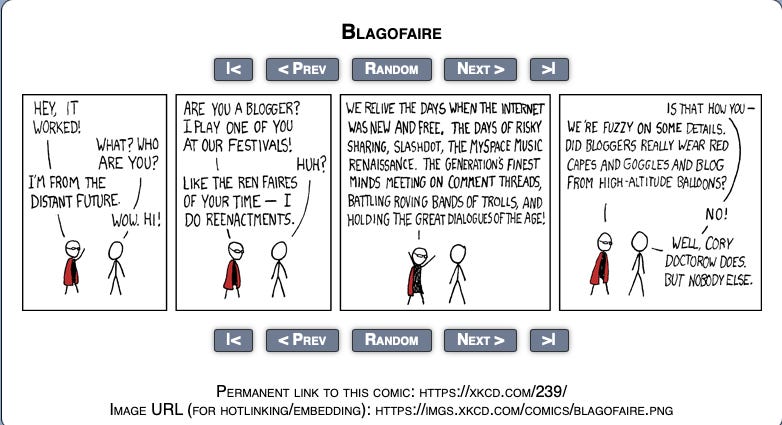Key Insights:
Cory Doctorow is AWESOME!
It is depressing. We once, with the creation of the market economy, got interoperability right. But now the political economy blocks us from there being any obvious path to an equivalent lucky historical accident in our future.
The problems in our society are not diametrically opposed: Addressing the problems of one thing doesn't necessarily create equal and opposite problems on the other side—but it does change the trade-offs, and so things become very complex and very difficult to solve.
Always keep a trash bag in your car.
Hexapodia!
References:
Books:
Cory Doctorow: How to Destroy Surveillance Capitalism <https://www.google.com/books/edition/How_to_Destroy_Surveillance_Capitalism/W20NzgEACAAJ>
Cory Doctorow: Attack Surface <https://www.google.com/books/edition/Attack_Surface/rFfEDwAAQBAJ>
Cory Doctorow: Walkaway <https://www.google.com/books/edition/Walkaway/MKMsDAAAQBAJ>
Cory Doctorow: Down & Out in the Magic Kingdom <https://www.google.com/books/edition/Down_and_Out_in_the_Magic_Kingdom/h8DvDwAAQBA>
Cory Doctorow: Little Brother <https://www.google.com/books/edition/Little_Brother/r1zne2mZDW8C>
William Flesch:Comeuppance: Costly Signaling, Altruistic Punishment, and Other Biological Components of Fiction <https://www.google.com/books/edition/Comeuppance/JSRWPYp1nNUC>
Daniel L. Rubinfeld: A Retrospective on U.S. v. Microsoft: Why Does It Resonate Today? <https://journals.sagepub.com/doi/abs/10.1177/0003603X20950227>
Louis Galambos & Peter Temin: The Fall of the Bell System: A Study in Prices & Politics <https://www.google.com/books/edition/The_Fall_of_the_Bell_System/CXNPVjdxfAEC>
Websites:
Electronic Frontier Foundation: <http://www.eff.org>
Adversarial Interop Case Studies: <https://www.eff.org/deeplinks/2019/10/adversarial-interoperability>
Privacy without Monopoly: <https://www.eff.org/wp/interoperability-and-privacy>
Cory Doctorow: Craphound <http://craphound.net>
Cory Doctorow: Pluralistic <https://pluralistic.net>
&, of course:
Vernor Vinge: A Fire Upon the Deep <https://books.google.com/books?id=fCCWWgZ7d6UC>
(Remember: You can subscribe to this… weblog-like newsletter… here:
There’s a free email list. There’s a paid-subscription list with (at the moment, only a few) extras too.)
Grammatized Transcript:
Brad: Noah! What is the key insight?
Noah: Hexapodia is the key insight! Six feet!
Brad: And what is that supposed to mean?
Noah: That there is some nugget of fact that, if you grasp it correctly and place it in the proper context, will transform your view of the situation and allow you to grok it completely.
Brad: And in the context of Vernor Vinge’s amazing and mind-Bending science-fiction space-opera novel A Fire Upon the Deep?
Noah: The importance of “hexapodia” is that those sapient bushes…
Brad: …riding around on six wheeled scooters have been genetically…
Noah: …programmed to be a fifth column of spies and agents for the Great Evil.
Brad: However, here we seek different key insights than “hexapodia”. Today we seek them from the genius science-fiction author and social commentator Cory Doctorow. I think of him as—it was Patrick Nielsen Hayden, I think, who said around 2004: that he felt like he was living in the future of Scottish science fiction author, Ken MacLeod. And he wished Ken would just stop. At times I feel that way about Cory. But we are very happy to have him here. His latest book is How to Destroy Surveillance Capitalism IIRC, his latest fiction is Attack Surface. My favorite two books of his are Walkaway and—I think it was your first—Down & Out in the Magic Kingdom.
Cory: That's right. Yes. Thank you. Thank you for that very effusive introduction. I decry all claims of genius, though.
Brad: Well, we know this is a problem. When one is dealing with an author whose work one has read a lot of—by reading your books.by now I've spent forty hours of my life looking at squiggles on a page or on a screen and, through a complicated mental process, downloaded to my wetware and then run on it a program that is my image of a sub-Turing instantiation of your mind, who has then told me many very entertaining and excellent stories. So I feel like I know you very well…
Cory: There’s this infamous and very funny old auto reply that Neal Stephenson used to send to people who emailed him. It basically went: “Ah, I get it. You feel like you were next to me when we were with Hero Protagonist in Alaska fighting off the right-wing militias. But while you were there with me, I wasn't there with you. And so I understand why you want to, like, sit around and talk about our old military campaigns. But I wasn't on that campaign with you.
Brad: Yes. It was only my own imago, my created sub-Turing instantiation of your mind that was there…
Cory: Indeed. We are getting off of interoperability, which is what I think we're mostly going to talk about. But this is my cogpsy theory of why fiction works, and where the fanfic dispute comes from.
Writers have this very precious thing they say. It is: “I'm writing and I'm writing and all of a sudden the characters start telling me what they want to do.” I think that what they actually mean by that is that we all have this completely automatic process by which we try and create models of the people we encounter. Sometimes we never encounter those people. We just encounter second-hand evidence of them. Sometimes those people don't live at all. Think about the people who feel great empathy for imaginary people that cruel catfishers have invented on the internet to document their imaginary battles with cancer. They then feel deeply hurt and betrayed and confused, when this person they've come to empathize with turns out to be a figment of someone else's imagination.
I think what happens when you write is that you generate this optical link between two parts of your brain that don't normally talk to each other. There are these words that you are explicitly thinking up that show up on your screen. And then those words are being processed by your eyeballs and being turned into fodder for a model in this very naive way. And then the model gets enough flesh on the bones—so it starts telling you what it wants to do. At this point you are basically breathing your own exhaust fumes here. But it really does take what is at first a somewhat embarrassing process of putting on a puppet show for yourself: “Like, everybody, let’s go on a quest!” “That sounds great!” “Here we go!” It just becomes something where you don't feel like you're explicitly telling yourself a story.
Now the corollary of this is that it sort of explains the mystery of why we like stories, right? Why we have these completely involuntary, emotional responses to the imaginary experiences of people who never lived and died and have no consequence. The most tragic death in literature of Romeo and Juliet is as nothing next to the death of the yogurt I digested with breakfast this morning, because that yogurt was alive and now it's dead and Romeo and Juliet never lived, never died, nothing that happened to them happened. Yet you hear about the Romeo and Juliet…
Noah: …except that a human reads about Romeo and Juliet and cares…
Cory: That is where it matters, yes indeed. But the mechanism by which we care is our build this model which is then subjected to the author's torments, and then we feel empathy for the model. What that means is that the readers, when they're done, if the book hit its aesthetic marks, if it did the thing that literature does to make it aesthetically pleasing—then the reader still has a persistent model in the same way that if your granny dies, you still have a model of your granny, right? You are still there.
That is why fanfic exists. The characters continue to have imagined lives. If the characters don't go on having imagined lives, then the book never landed for you.
And that’s why authors get so pissy about fanfic. They too have this model that they didn't set out to explicitly create, but it's there. And it's important to their writing process. And if someone is putting data in about that modeled person that is not consistent with the author's own perception of them, that creates enormous dissonance. I think that if we understood this, we would stop arguing about fanfic.
Noah: We argue about fanfic?
Brad: Oh yes, there are people who do. I remember—in some sense, the most precious thing I ever read was Jo Walton saying that she believed that Ursula K. LeGuin did not understand her own dragons at all…
Noah: …Yep, correct…
Cory: Poppy Bright—back when Poppy Bright was using that name and had that gender identity—was kicked out of a fan group for Poppy Bright fans on LiveJournal for not understanding Poppy Bright’s literature. I think that's completely true. Ray Bradbury to his dying day insisted that Fahrenheit 451 had nothing to do with censorship but was about the dangers of television…
Brad: Fanfic is an old and wonderful tradition. It goes back to Virgil, right? What is the Aeneid but Iliad fanfic?
Cory: And what is Genesis but Babylonian fanfic? It goes a lot further back than that…
Brad: Today, however, we are here to talk not about humans as narrative-loving animals, not about the sheer weirdness of all the things that we run on our wetware, but about “mandated interoperability”, and similar things—how we are actually going to try to get a handle on the information and attention network economy that we are building out in a more bizarre and irrational way than I would have ever thought possible.
Cory: Yes. I don't know if the audience will see this, but the title that you've chosen is: “Mandated Interoperability Is Not Going to Work”. I am more interested in how we make mandated interoperability work. I don't think it's a dead letter. I think that to understand what's what's happened you have to understand that the main efficiency that large firms bring to the market is regulatory capture. In an industry with only four or five major companies, all of the executives almost by definition must have worked at one or two of the other ones. Think of Sheryl Sandberg, moving from Google to Facebook.
They form an emerging consensus. Sometimes they all sit around the same a boardroom table. Remember that photo of the tech leaders around the table at the top of Trump Tower? They converge on a set of overlapping lobbying priorities. They have a lot of excess rents that they can extract to mobilize lobbying in favor of that. One of the things that these firms have done in the forty years of the tech industry is to move from a posture where they were all upstarts and were foursquare for interoperability with the existing platforms—because they understood that things like network advantages were mostly important in as much as they conferred a penalty for switching, and that if you could switch easily then the network advantage disappeared. If you could read Microsoft Office documents on a Mac, then the fact that there's a huge network effect of Microsoft Office documents out there is irrelevant. Why? Because you can just run switch ads, and say every document ever created with Microsoft Office is now a reason to own a Mac.
But as they became dominant, and as their industries have become super-concentrated, they have swung against interoperability. I think that we need a couple of remedies for that. I think that we need some orderly structured remedies in the forms of standards. We need to check whether or not those standards are mandated. And we’ve seen how those standards can be subverted. And so I think we need something that stops dominant firms from subverting standards—a penalty that they pay that is market-based, that impacts their bottom line, and that doesn't rely on a slow-moving or possibly captured regulator but that, instead, can actually just emerge in real time.
That is what I call “adversarial interoperability”: reverse engineering and scraping and bots. Steve Jobs paying some engineers to reverse engineer Microsoft Office file formats and make iWork suite, instead of begging Bill Gates to rescue the Mac…
Brad: …But he did beg Bill Gates to rescue the Mac…
Cory: He did that as well. But that wasn't the whole story. He had a carrot and a stick. He had: let's have a managed, structured market. Right. And then he had: what happens if you don't come up to my standards is that we have alternatives, because we can just reverse-engineer your stuff. Look at, for example, the way that we standardized the formatting of personal finance information. There were standards that no one adopted. Then Mint came along, and they wrote bots, and you would give the bots your login credentials for your bank, and they would go and scrape your account data and put it into a single unified interface.
This was adversarial interoperability. This spurred the banks to actually come into compliance with the standard. Rather than having this guerrilla warfare, they wanted a quantifiable business process that they could understand from year to year that wouldn't throw a lot of surprises that would disrupt their other other plans.
Brad: Let me back up: In the beginning, the spirit of Charles Babbage moved upon the face of the waters, and Babbage said: “Let there be electromechanical calculating devices”. And there was IBM. And IBM then bred with DARPA in the form of the Sage Air Defense, and begat generation upon generation of programmers. And from them was born FORTRAN and System 360.
And FORTRAN and IBM System 360 bestrode the world like the giants of the Nephilim, and Babbage saw it, and it was good. And there was nibbling around the edges from Digital Equipment and Data General.
Yea, until one day out of Silicon Valley, there emerged crystallized sand doped with germanium atoms, and everything was upset as out of CERN and there emerged the http protocol. All the companies that had been construct their own walled information gardens, and requiring you to sign up with AOL and CompuServe and Genie and four or five others in order to access databases through gopher and whatever—they found themselves overwhelmed by the interoperability tide of the internet.
And for fifteen years there was interoperability and openness and http and rss, and everyone frantically trying to make their things as interoperable as possible so that they could get their share of this absolutely exploding network of human creativity and ideas.
And then it all stopped. People turned on a dime. They began building their own walled gardens again.
Noah: I feel like we did just get Neal Stephenson on this podcast…
Brad: Sub-Turing! It's a sub-Turing instantiation of a Neal Stephenson imago!
Cory: I think that your point of view or generational outlook or whatever creates a different lens than mine. I think about it like this: In 1979 we got an Apple II+. In 1980, we got a modem card for it. Right. By 1982, there were a lot of BBS’s and that was great. Even though we were in Canada, the BBS software was coming up from the American market. We had local dial-up BBS's running software that was being mailed around on floppies…
Brad: Whish whish whine… Beep beep… Whish… I am trying to make modem noises…
Cory: that sounded like V.42bis.
And then by 1984 there were the PC clones. Everyone had a computer. This company that no one had ever heard of—Microsoft—suddenly grew very big. They created this dynamism in the industry. You could have a big old giant, like IBM. You could have two guys in a garage, like Microsoft. The one could eclipse the other. IBM couldn't even keep control of its PCs. They were being cloned left and right. And then Microsoft became the thing that had slain. It became a giant. And the DOJ intervened. Even though Microsoft won the suit ultimately—they weren't broken up…
Brad: They did back off from destroying Google…
Cory: What’s missing from that account is the specific mechanisms. We got modems because we got cheap, long distance. We got that because 1982 we had the ATT breakup. Leading up to the breakup shifted the microeconomics. People ATT were all: don’t do that. It's going to piss off the enforcers. We've got this breakup to deal with
Brad: Yes. The enforcers, the enforcers are important. Both the Modification of Final Judgment. And ATT’s anticipatory reaction to it. Plus the periodic attempted antitrust kneecappings of IBM. They meant that when people in IBM turned around and said: “Wait a minute. When we started the PC project, John F. Akers told us we needed to find something for Mary Gates’s boy Bill to do, because he sat next to her at United Way board meetings. But this is turning into a monster. We need to squelch them.” And from the C-suite came down: “No, our antitrust position is sufficiently fraught that we can't move to squash Microsoft.”
Cory: Yes. IBM spent 12 years in antitrust litigation. Hell, they called it. Antitrust as Vietnam. They essentially had been tied by the ankles to the back of DOJ’s bumper and dragged up and down a gravel road for 12 years. They were outspending the entire DOJ legal department every single year for that one case. And one of the things that DOJ really didn't like about IBM was tying software to hardware.
And so when Phoenix makes the IBM ROM clone, IBM is like: Yeah, whatever. Any costs we pay because of the clone ROM are going to be lower than the costs we will incur if we get back into antitrust hell—and the same goes for Microsoft. They got scared off. What we were seeing, what it felt like, the optimism that I think we felt and of which we were aware was—it looked like we'd have protocols and not products, and we'd have a pluralistic internet, not five giant websites filled with screenshots of text from the other.
But our misapprehension was not due to technological factors. It was our failing to understand that like Bork and Reagan had shivved antitrust in the guts in 1980, and it was bleeding out. So by the time Google was big enough to do to everyone else what Microsoft had not been able to do to them, there was no one there to stop Google.
Noah: Cory, let me ask a question here. I'm the designated grump of the podcast. Brad is the designated history expounder. I want to know: Why do we care right right now? I've written about interoperability with regards to electric cars and other emerging technologies. What things in the software world are people hurt by not having interoperability for? What are the big harms in software to consumers or to other stakeholders from lack of interoperability?
Cory: Let me frame the question before I answer it.
We have market concentration in lots of different sectors for similar reasons, mergers. We should have different remedies for them. We heard about Babbage. I would talk about Turing and the universality of the computer. Interoperability represents a pro-competitive remedy to anti-competitive practices that is distinct and specific to computers.
I don't know if you folks know about the middle-gauge muddle in Australia. Independent states and would-be rail barons laid their own gauge rail across the country. You can't get a piece of rolling stock from one edge of the country to the other. For 150 years they have been trying to build designs that can drop one set of wheels where the track needs it. And none of them have worked. And now their solution is to tear up rails and put down new rails.
If that was a software object, we just write a compatibility layer. Where we have these durable anti-competitive effects in the physical world, that sometimes necessitate these very difficult remedies, we can actually facilitate decentralized remedies where people can seize the means of computation to create digital remedies: self-determination, the right to decide how to talk to their friends and under what circumstances, as opposed to being forced to choose between being a social person and being private…
Brad: For me, at least there are lots and lots of frictions that keep me from seeing things that I would like to see, and keep me from cross-referencing things that I would like to cross-references. There are bunches of things I've seen on Twitter and Facebook in the past that, because they are inside the walled gardens. I definitely am not able to get them out quickly and easily and cheaply enough to put them into the wider ideas flow. And I feel stupider as a result. And then there are all the people who have been trapped by their own kind of cognitive functioning, so that they are now a bunch of zombies with eyeballs glued to the screen being fed terror so that they can be sold fake diabetes cures and overpriced gold funds…
Noah: That’s a good angle right here. If we look at the real harms that are coming through the internet right now—I worry about Kill Zones, and of course I worry about the next cool thing getting swallowed up by predatory acquisitions. That's our legitimate worry for sure. When I look at the internet and what bad the internet is causing, I do not see the lack of alternative information sources as the biggest problem. I see the people who are the biggest problem as coming precisely from alternative information sources.
This is not to say we should get rid of those sources. This is not to say we should have mass censorship and ban all the anti-vax sites. I'm not saying that.
But if we look at the issues—there was a mass banning of Trump and many of the Q-Anons from the main social media websites, and yet a vast underground network of alternative right wing media has sprung up.
Cory: It seems like they were able to. Let me redirect from the harms that Brad raised. I think those are perfectly good harms. But I want to go to some broader harms.
In the purely digital online world, we had some people we advised at EFF who were part of a medical cancer previvor group—people who have a gene that indicates a very high likelihood of cancer, women. They had been aggressively courted by Facebook at a time when they were trying to grow up their medical communities. And one of the members of this group who wasn't a security researcher or anything was just noodling around on Facebook, and found that you could enumerate the membership of every group on Facebook, including hers. She reported that to Facebook. That's obviously a really significant potential harm to people in the medical communities. She reported it to Facebook. Facebook characterized her report as a feature request and won't fix it. She made more of a stink. They said: fine, we're going to do a partial fix because it would have interfered with their ad-tech stack to do a full fix. So you have to be a member of a group to enumerate the group. This was still insufficient.
But they had this big problem with inertia—with the collective action problem of getting everyone who's now on Facebook to leave Facebook and go somewhere else. They were all holding each other mutually hostage. Now you could imagine that they could have set up a Diaspora instance, and they could have either had a mandated- or standards-defined interface that allowed those people to talk to their friends on Facebook. And they could have a little footer at the bottom of each message: today 22% of the traffic in this group originated on our diaspora, once that tips to 60% were all leaving, and quitting Facebook. They might do this with a bot, without Facebook's cooperation, in the absence of Facebook's legal right to prevent those bots.
Facebook has weaponized the computer fraud and abuse act and other laws to prevent people from making these bots to allow them to inter-operate with Facebook—even though, when Facebook started, the way that it dealt with its issues with MySpace was creating MySpace spots, where you could input your login and password, and it would get your waiting MySpace messages and put them in your Facebook inbox and let you reply to them. Facebook has since sued Power Ventures for doing the same thing. They’re engaged in legal activity against other bot producers that are doing beneficial pro-user things.
That's one harm.
Another harm that I think is really important here is repair. Independent repairs are about 5% of US GDP. The lack of access to repair is of particular harm to people who are already harmed the most: it raises the cost of being poor. The ability to control repair is a source of windfall profits. Tim Cook advised his investors in 2019, the year after he killed twenty right-to-repair bills at these state level, that the biggest threat to Apple's profits was that people were fixing their devices instead of throwing them away. It’s an environmental problem, and so on. The biggest problem with right-to-repair is not that the companies don't provide their data or the diagnostic codes or encrypt diagnostic codes. The problem is that you face felony prosecution under the CFAA and DMCA, as well as ancillary stuff like non-compete and non-disclosure, and so on through federal trade secrecy law, if you create tools to repairs without the cooperation of the vendors. This is a real harm that arises out of the rules that have been exploited to block interoperability.
Brad: This goes deep, right? This affects not just tech but the world, or, rather, because tech has eaten the world, hard-right unsympathetic state representatives from rural Missouri are incredibly exercised about right-to-repair, and the fact that John Deere does not have enough internal capacity to repair all the tractors that need to be repaired in the three weeks before the most critical-need part of the year.
Cory: This is an important fracture line. There are people who have a purely instrumental view: me my constituents need tractor repair, so I will do whatever it takes to get them tractor repair. In California we got a terrible compromise on this brokered with John Deere—it was basically a conduct remedy instead of a structural change. Right.
Something I questioned a lot about Klobuchar’s antitrust story is that she keeps saying: I believe that we need to jettison the 40-year consumer-welfare standard and return to a more muscular antitrust that is predicated on social harms that include other stakeholders besides consumers paying higher prices, and I have a bipartisan consensus on this because Josh Hawley agrees with me, but Josh Hawley does not agree with her. Josh Hawley just wants to get Alex Jones back on Twitter, right. And that's like, it begins and ends there.
She might be able to get the inertia going where Josh Hawley is put in the bind where he either has to brief for a more broad antitrust cause of action that includes social harms, or he has to abandon Alex Jones to not being on Twitter. And maybe he'll take Alex Jones if that's the price. But I do think that that's a huge fracture line, that there are honest brokers who don't care about the underlying principle and the long run effects of bad policy. And there are people who just want to fix something for a political point or immediate benefit.
Brad: Fixing it to the extent that fixing something scores a political point—that does mean actually doing good things for your constituents, who include not just Alex Jones, but the guys in rural Missouri who want their John Deere tractors repaired cheaply.
Cory: This is how I feel about de platforming. I was angry about deplatforming for 10 years, when it was pipeline activists and sex workers and drag queens who were being forced to use their real name, and trans people were forced to use their dead names, and political dissidents in countries where they could be rounded up and tortured and murdered if they adhere to Facebook’s real names policy, and all of that stuff. First they came for the drag queens, and I said nothing because I wasn't a drag queen. Then they came for the far right conspiratorialists.
But they're fair-weather friends.
It's like the split between open source and free software where, you know, the benefits of technological self-determination were subsumed into the instrumental benefits of having access to the source so you could improve it. What we have is free software for the tech monopolists, for they can see the source and modify the source of everything on their backend. And we have open source for the rest of us. We can inspect the source, we can improve their software for them, but we don't get to choose how their backends run. And since everything loops through their backends, we no longer have software freedom. That's the risk if you decouple instrumental from ethical propositions. You can end up with a purely instrumental fix that leaves the ethical things that worry you untouched, and in fact in a declining spiral.
Noah: I want to argue. I don’t think we don't get enough argument on this podcast. I want to inject a little here.
A turning point for my generation in terms of our use of the internet was Gamergate. That happened in 2014. Gamergate largely morphed after that into the the Trump movement and the alt-right. Gamergate destroyed what I knew as online nerd culture. It was an extinction-level event for the idea that nerd culture existed apart from the rest of society. It was a terrible thing. Maybe nerd culture couldn't have lasted, but a giant subculture that I enjoyed and partially defined myself by as a young person was gone. And not only that, not only me—I’m centering myself and making all about me here, but a lot of people got harassed. Some good friends of mine got harassed. It was really terrible as an event in and of itself, irrespective of the long-term effects.
Even Moot, a big, huge defender of anonymity and free speech, eventually banned Gamergate topics from 4chan. That was the moment when I realized that the idea of free speech as free speech guarded by individual forums or platforms separately from the government—that that idea was dead. When Moot banned banned Gamergate from 4chan, I said: okay, we're in a different era. That was the Edward R Murrow moment. That was the moment we started going back toward Dan Rather and Edward R Murrow and the big three television companies in the 1950s—when Moot banned Gamergate.
Maybe this just has to happen. Maybe bad actors are able to always co-opt a fragmented internet. There’s no amount of individual Nazi punching that can get the Nazis out. If you have people whose speech is entirely focused on destroying other people's right to speak, as Gamergate was, then then free speech means nothing because no one feels free to speak. I wonder whether fragmentation of platforms makes it harder to police things like Gamergate and thus causes Nazis to fractally permeate each little space on the internet and every little pool of the internet. Wherever we have one big pool, we have economies of scale in guarding that pool.
Brad: That is: what you are saying is that an information world of just four monopolistic, highly oligopolistic, walled gardens is bad, but an internet in which you cannot build any wall around your garden is bad as well. Then what we really need is a hundred walled gardens blooming, perhaps. But I want to hear what Cory has to say about this and interoperability.
Cory: I found that so interesting. I had to get out some, no paper and take notes.
First of all, I would trace back before the Gamergate issue. Before it was the Sad Puppies, the disruption of the Hugo awards by far-right authors was before Gamergate. It was the same ringleaders. Gamergate was the second act of sad puppies. So I'm there with you.
I was raised by Trotskyists. I want to say that, listening to you describe how you feel about nerd culture after you discovered that half of your colleagues and friends were violent misogynists—it sounds a lot like how Trotskyists talk about Stalinists, right. You have just recounted the the internet nerd version of Homage to Catalonia. Orwell goes to Spain to fight the fascist and a Stalinist shoots him through the throat.
We in outsider or insurgent or subcultural movements often have within our conception of a group people who share some characteristics and diverge on others. We paper over those divergences until they fracture. Think about the punk Nazi-punk split. This anti-authoritarian movement is united around a common aesthetic and music and a shared cultural identity. And there's this political authoritarian anti-authoritarian things sitting in the middle. And they just don't talk about it until they start talking about it—Dead Kennedys record: Nazi punks f-—- off. And here we are, still in the midst of that reckoning. That's where Stormfront comes from and all the rest of it.
This is not distinct to the internet. It is probably unrealistic, it's definitely unrealistic for there to be a regime in which conduct that is lawful can find no home. Not that not that it won't happen in your home, but that it won't happen in anyone's home. The normative remedy where we just make some conduct that is lawful so far beyond the pale that everyone ceases to engage in it—that has never really existed. Right. You can see that with conduct that we might welcome today, as you know, socially fine and conduct that we dislike—whether that's, you know, polyamory. You go back to the future house, where Judy Merrill and, and Fred Pohl and C.M. Kornbluth lived in the thirties, and they had this big, weird polyamorous household of leftist science fiction writers write at a time when it was unmentionably weird to do it. And today it's pretty mainstream—at least in some parts of California.
In the absence of an actual law against it, it's probably going to happen. The first question is: is our response to people who have odious ideas that we want there to be nowhere where they can talk about it? If that's the case, we'll probably have to make a law against them.
Noah: Right. But hold on. Is it ideas, or is it actions? If you harass someone you're not expressing an idea, you're stopping them from expressing theirs.
Cory: Absolutely. So, so the issue is: that there are Nazis talking to other Nazis is okay. It's just that when Nazis talked to other Nazis and figured out how to go harass someone. Let me give you an example of someone I know who is in the midst of one of these harassment campaigns.
Now there's a brilliant writer, a librettist, novelist, and comics author named Cecile Castellucci. She also used to be like a pioneering Riot Girl and toured with Sloan. So she's just this great polymath person. And because she's a woman who writes comics, men on the internet hate her. And there's a small and dedicated cadre of these men who figured out a way to mess with women on Twitter. They send you a DM that is really violent and disgusting. They wait until they see the read receipt, and then they delete it. Twitter, to its credit, will not accept screenshotted DMs as evidence of harassment, because it would be very easy for those same men to forge DMs from their targets and get those people kicked off Twitter. Then what they do is they revictimize their targets by making public timeline mentions that comport with Twitter's rules unless you've seen the private message. And they make references to the private message that trigger the emotions from the private message over and over again.
It is a really effective harassment technique.
The women they use it against are stuck on Twitter, because their professional lives require them to be on Twitter, right. Their careers would end to some important degree if they weren't part of this conversation on Twitter.
Now, imagine if you had Gotham Clock Tower, Barbara Gordon's secret home, which was a Mastodon instance that was federated with Twitter, either through a standard or through a mandate or through adversarial interoperability. There could be a dozen women there who could agree that among themselves that they're willing to treat screenshotted DMs as evidence of harassment, so that they could block and silence and erase the all presence of these horrible men. We'd still want Twitter to do something about them, but if some of those men slipped through Twitter’s defenses as they will, not just because they can't catch everyone when they're at the scale, but because the range of normal activities at scale is so broad: a hundred million people have a hundred and one million use cases every day. Then those people are that, that those people could still be on Twitter, but not subject to the harassment of Twitter. It's a way for them.
Maybe, in the way that we talk about states being democracy's laboratories, maybe these satellite communities could pioneer moderation techniques that range beyond takedowns or account terminations or warning labels. There are so many different ways we could deal with this. You could render some comments automatically in Comic Sans. They could try them and see if they work. And they could be adopted back into main Twitter. That's what self-determination gets you: it gets you the right to set the rules of your discourse, and it gets you the right to decide who you trust to be within the group of people who make those rules.
Brad: So if we had the real interoperable world, we would have lots that would screen things according to someone's preferences. And you could sign up to have that bot included in your particular bot list to pre-process and filter, so that you don't have to wade through the garbage.
Cory: Sure. And there might be some conduct that we consider so far beyond the pale that we actually criminalize it. Then we can take the platforms where that conduct routinely takes place and things like reforms to 230 would cease to be nearly so important. We would be saying that if you are abetting unlawful conduct, when we see a remedy for preventing this unlawful conduct, and you refusing to implement that remedy, we might defenestrate you. We might do something worse.
Think of how the phone network works.It is standardized. There are these standard interchanges. There's lots of ways it can be abused. Every now and and then, from some Caribbean Island, we get a call that fakes a number from a Caribbean Island, and if you call it back, you're billed at $20 a minute for a long distance to have someone go: no, it was a wrong number. When that happens, the telco either cleans up its act or all the other telcos break their connection to it. There's certain conduct that's unlawful on the phone network, not unlawful because it cheats the phone company—not toll fraud—but unlawful because it's bad for the rest of the world, like calling bomb threats in. Either the customer gets terminated or the operator is disciplined by law.
All of those things can work without having to be in this in this regime where you have paternalistic control, where you vest all of your hope in a God-King who faces no penalty if he makes a bad call. They say: we’ll defend your privacy when the FBI wants to break the iPhone. But when they threaten to shut down our manufacturing, we'll let them spy on you even as they're opening up concentration camps and putting a million people in them.
Brad: Was that the real serpent in all of these walled gardens? Was the advertising-supported model the thing that turns your eyeballs into the commodity to be enserfed. If we had the heaven of micropayments, would we manage to avoid all of this?
Cory: We've had advertising for a long time. The toxicity of advertising is pretty new. Mostly what's toxic about advertising is surveillance, and not because I think the surveillance allows them to do feats of mind control. I think everyone who's ever claimed to have mind control turned out to be lying to themselves or everyone else. Certainly there is not a lot of evidence for it. You have these Facebook large-scale experiments: 60 million people subjected to a nonconsensual, psychological intervention to see if they can be convinced to vote. And you get 0.38% effect size. Facebook should be disqualified from running a lemonade stand if we catch them performing nonconsensual experiments on 60 million people. But, at the same time, 0.38% effect sizes are not mind control.
They do engage in a lot of surveillance. It’s super-harmful because it leaks, because it allows them to do digital redlining, because it allows them to reliably target fascists with messages that if they were uttered in public, where everyone could see them, might cause the advertiser to be in bad odor. They can take these dog whistles and they can whisper them to the people who won’t spread them around.
Those are real harms.
You have to ask yourself: why don't we have a privacy law that prohibits the nonconsensual gathering of data and imposes meaningful penalties on people who breach data? I was working in the EU. GDPR was passed. The commissioners I spoke to there said: no one has ever lobbied me as hard as I've been lobbied now. Right now we have more concentration in ad tech than in any other industry, I think, except for maybe eyeglasses, glass bottles, and professional wrestling.
Brad: Are we then reduced to: “Help us, Tim Cook! You are our only hope!”?
Cory: I think that that's wrong, because Tim Cook doesn't want to give you self-determination. Tim wants you to be subject to his determinations. Among those determinations are some good ones. He doesn't want Facebook to own your eyeballs. You go, Tim. But he also wants you to drop your iPhone in a shredder every 18 months, rather than getting it fixed.
Brad: Although I must say, looking at the M1 chip, I'm very tempted to take my laptop and throw it in the shredder today to force me to buy a new one.
Noah: It's interesting how iPhone conquered. And yet very few people still use Macs. Steve Jobs’s dream was never actualized.
Cory: Firms that are highly concentrated distort policy outcomes, and ad tech is highly concentrated. And we have some obviously distorted policy outcomes. We don't have a federal privacy law with a private right of action. There are no meaningful penalties for breaches. We understand that breaches have compounding effects. A breach that doesn't contain any data that is harmful to the user can be merged with another breach and together they can be harmful—and that's cumulative. And data has a long half-life.
Just this week, Ed Felton's old lab published a paper on how old phone numbers can be used to defeat two-factor authentication. You go through a breach, find all the phone numbers that are associated with the two-factor authentication. Then you can go to Verizon and ask: which of these phone numbers is available? Which of these people has changed their phone number? Then you can request that phone number on a new signup—and then you can break into their bank account and steal all their money. Old breaches are cumulative. Yet we still have this actual-damages regime for breaches instead of statutory damages that take account of the downstream effects and these unquantifiable risks that are imposed on the general public through the nonconsensual collection and retention of data under conditions that inevitably lead to breaches.
Brad: Okay. Well, I'm very down. So are we ready to end? I think we should end on this downer note.
Noah: My favorite Cory Doctorow books also end on a downer note.
Brad: Yes. Basically that the political economy does not allow us to move out of this particular fresh semi-hell in which we're embedded. But you had something to say?
Cory: Everybody hates monopolies now. So we'll just team up with the people angry about professional wrestling monopolies and eyeglass monopolies and beer monopolies, and we'll form a Prairie Fire United Front of people who will break the monopoly because we're all on the same side—even though we're fighting our different corners of it—the same way that ecology took people who cared about owls and put them on the side of people who care about ozone layers, even though charismatic, nocturnal birds are not the gaseous composition of the upper atmosphere.
Brad: Hey, if you have the charismatic megafauna on your side, you’re golden.
Noah: How did the original Prairie Fire work out? Let's let's wrap it up there. This is really great episode. Cory, you're awesome. Thanks so much for coming on and feel free to come back in time.
Cory: I’d love to. I've just turned in a book about money laundering and cryptocurrency—a noir cyberthreat thriller. Maybe when that comes out, I can come on and we can talk about that. That feels like it's up your guys' alley.
Brad: That would be great. Okay. So, as we end this: Noah, what is the key insight?
Noah: Hexapodia is the key insight. And what are the other key insights that we got from this day?
Brad: DeLong: I'm just depressed. I had a riff about how we got interoperability right with the creation of the market economy and the end of feudalism—and how that was a very lucky historical accident. But I don't see possibilities for an equivalent lucky historical accident in our future.
Noah: I have a key insight. It is a little vague, but hopefully it will be good fodder for future episodes. The problems in our society are not diametrically opposed. We have to find optimal interior-solution trade-offs between things that have a non-zero dot product. Sometimes solving the problem with one thing doesn't necessarily create exactly equal and opposite problems on the other side. Instead, it changes the trade-offs that you face with regard to other problems. These things become very complex. You have things like the antitrust problem and things like the Nazi problem. In your society addressing one doesn't necessarily worsen the other. More action against Nazis doesn't necessarily mean less action in antitrust. It's simply means you have to think about antitrust in a slightly different way, and vice versa. That does make these institutional problems very difficult to solve.
Brad: Cory, do you wish to add a key insight,
Cory: A key insight is: always keep a trash bag in your car.
Brad: This has been Brad DeLong and Noah Smith's podcast this week with the amazing Cory Doctorow. Thank you all very much for listening.

















PODCAST: Hexapodia XIII: "Mandated Interoperability": We Can't Make It Work, or Can We?